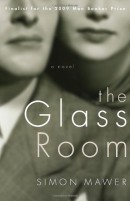 Simon Mawer’s novel, which was shortlisted for the Booker Prize, stars a modernist piece of architecture — the house of the title, which was built in Czechoslovakia for a newlywed couple, a Jew and a gentile, in 1930. Throughout the book, the house remains constant, but its residents change, and Mawer uses the cast to explore six decades of European history. The book was published to raves in the UK, including one by Ian Sansom, who approached it with skepticism:
Simon Mawer’s novel, which was shortlisted for the Booker Prize, stars a modernist piece of architecture — the house of the title, which was built in Czechoslovakia for a newlywed couple, a Jew and a gentile, in 1930. Throughout the book, the house remains constant, but its residents change, and Mawer uses the cast to explore six decades of European history. The book was published to raves in the UK, including one by Ian Sansom, who approached it with skepticism:
The Glass Room is a book about a culture slipping from decadence into catastrophic decline. It’s a study of a marriage. It concerns itself with art, music, architecture, indignity, loneliness, terror, betrayal, sex. And the Holocaust. It should, therefore, be pretentious, unbearable schlock of the most appalling kind. But it’s not. It is, unexpectedly, a thing of extraordinary beauty and symmetry. The Glass Room is a novel of ideas, yet strongly propelled by plot and characterized by an almost dreamlike simplicity of telling.
In the Spectator, Anita Brookner wrote:
It should be emphasized that this is not the sort of house that features in most English novels. There are no echoes of Brideshead here. This house—long, low, rectilinear—does not inspire sentimentality. It is its unfamiliar purity which is its outstanding feature, and this purity also characterizes the novel itself.
The book was published in the U.S. in October to similarly positive reviews, including one by Ron Charles in the Washington Post. Charles writes:
In chapter after chapter, era after era, the house miraculously continues, working as a talisman, “its spirit of transparency percolating the human beings who stand within it, rendering them as translucent as the glass itself.” Like this gorgeous novel, that’s an irresistible promise, though far more troubling than it first appears.
The Glass Room by Simon Mawer
Other press, 416 pp., $14.95

